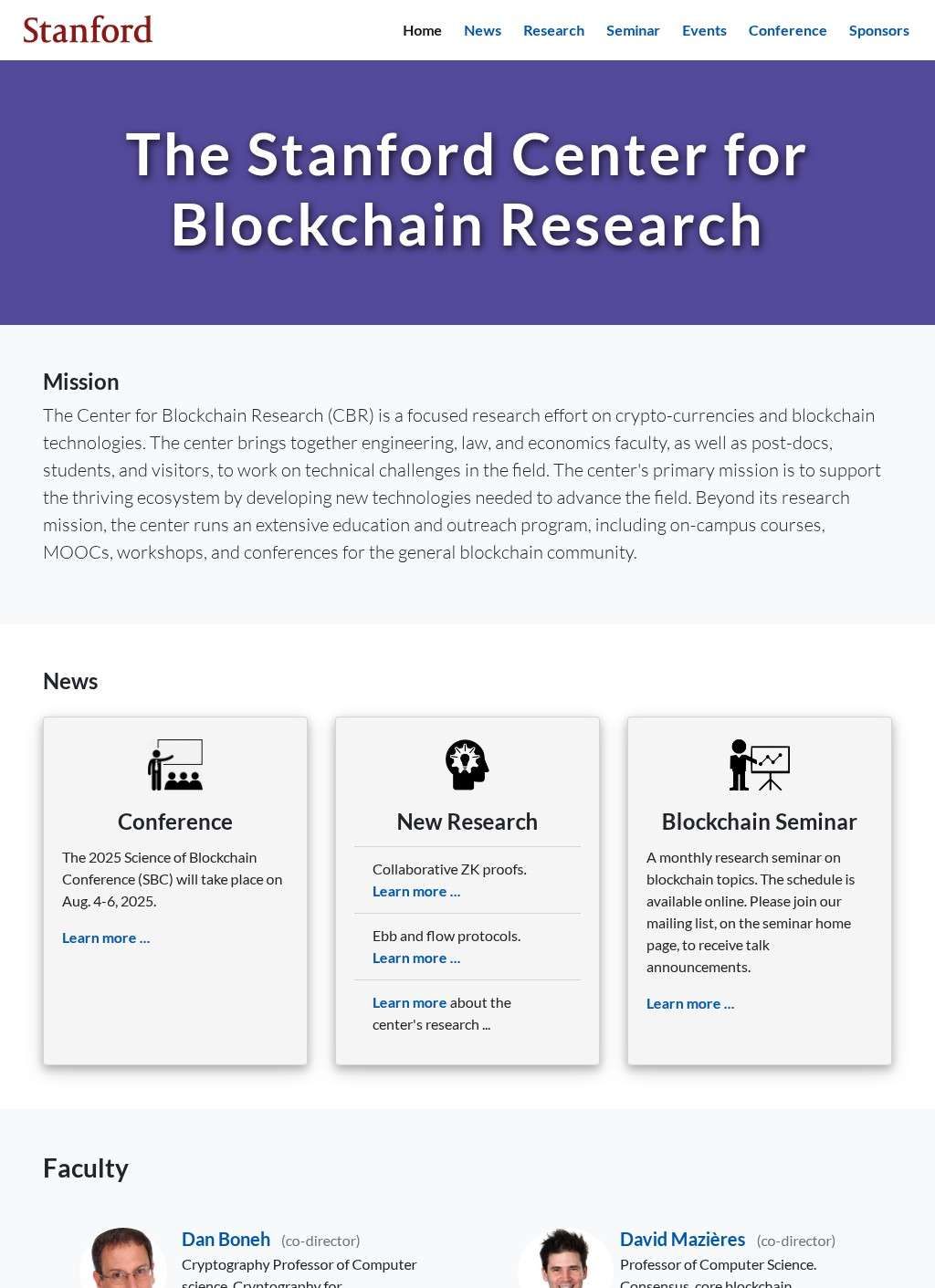The Stanford Center for Blockchain Research stands at the intersection of academic rigor and technological innovation, bringing world-class computer science expertise to bear on the fundamental challenges facing cryptocurrency infrastructure. Founded in 2018 by professors Dan Boneh and David Mazières, this research center has quickly established itself as a leading voice in blockchain technology development. The center's location in Silicon Valley provides unique advantages, facilitating collaboration between academic researchers and industry practitioners while maintaining the intellectual independence necessary for groundbreaking research.
The center's research portfolio spans the entire spectrum of blockchain infrastructure challenges, from low-level cryptographic primitives to high-level protocol design. Faculty members bring decades of expertise in distributed systems, cryptography, game theory, and computer security to bear on blockchain problems. This interdisciplinary approach proves essential for addressing the complex interactions between technical, economic, and social factors that determine whether blockchain systems succeed or fail. Research projects range from improving consensus mechanisms to developing privacy-preserving technologies that could enable new cryptocurrency applications.
Cryptographic innovation represents a core strength of the Stanford Center for Blockchain Research. Professor Dan Boneh, one of the world's leading cryptographers, guides research into advanced techniques like zero-knowledge proofs, threshold signatures, and verifiable delay functions. These cryptographic building blocks enable new possibilities for blockchain infrastructure - from scaling solutions that process thousands of transactions per second to privacy technologies that protect user data while maintaining regulatory compliance. The center's cryptographic research directly influences the design of next-generation blockchain protocols.
Education forms a vital component of the center's mission to advance blockchain infrastructure. Stanford offers some of the most comprehensive blockchain courses available at any university, including CS251: Cryptocurrencies and Blockchain Technologies. These courses don't just teach existing technology; they challenge students to think critically about fundamental design decisions and trade-offs. Graduate students working with the center conduct cutting-edge research while learning from pioneers in the field. Many alumni go on to found blockchain companies or lead infrastructure development at major projects.
The center's approach to research emphasizes practical impact alongside theoretical advancement. While papers published by center-affiliated researchers advance academic understanding, the work also produces open-source code and prototype systems that demonstrate feasibility. This commitment to "running code" ensures research insights translate into improvements for real blockchain networks. Several major cryptocurrency projects have incorporated research findings from the center into their protocol designs, improving security, scalability, or functionality.
Industry collaboration through the center takes various forms while maintaining academic independence. The center receives funding from leading blockchain organizations including the Ethereum Foundation, Protocol Labs, and others, but maintains strict policies preventing funders from influencing research directions. This arms-length relationship allows researchers to pursue fundamental questions without pressure to produce predetermined outcomes. Industry partners benefit from exposure to cutting-edge research and talent, while researchers gain insights into real-world challenges facing blockchain infrastructure.
The Stanford Blockchain Conference, organized by the center, has become one of the premier academic venues for blockchain research. Unlike industry conferences focused on business applications, this event emphasizes rigorous technical content. Presentations cover everything from theoretical computer science results to empirical studies of deployed blockchain systems. The conference brings together researchers from around the world, fostering collaboration and knowledge exchange that advances the entire field. Making talks freely available online extends the conference's impact far beyond attendees.
Security research at the center addresses critical vulnerabilities in blockchain infrastructure before they can be exploited. Researchers analyze existing protocols to identify weaknesses, develop formal verification techniques to prove security properties, and design new protocols resistant to known attacks. This proactive approach to security helps prevent catastrophic failures that could undermine trust in blockchain technology. The center's security research has identified and helped fix vulnerabilities in major blockchain projects, protecting billions of dollars in value.
The center actively explores blockchain applications beyond cryptocurrency, investigating how distributed ledger technology might transform other domains. Research projects examine supply chain tracking, digital identity systems, and decentralized governance mechanisms. By studying diverse applications, researchers gain insights into the fundamental capabilities and limitations of blockchain technology. This broader perspective informs the design of general-purpose infrastructure that can support various use cases rather than being optimized for financial applications alone.
Scalability remains one of the most pressing challenges for blockchain infrastructure, and the center dedicates significant resources to this problem. Research explores various approaches including sharding, layer-2 protocols, and novel consensus mechanisms. The EE374: Scaling Blockchains course specifically focuses on teaching students how to design systems that maintain decentralization and security while achieving high performance. This educational approach ensures the next generation of blockchain developers understands scalability challenges from first principles.
The center's commitment to open research benefits the entire blockchain ecosystem. All research papers are freely available, and much of the code developed by center researchers is released under open-source licenses. This openness accelerates progress by allowing others to build upon the center's work. It also demonstrates the value of academic research in advancing blockchain infrastructure - by remaining neutral and focusing on fundamental challenges, the center produces knowledge that benefits all participants rather than creating proprietary advantages.
Looking forward, the Stanford Center for Blockchain Research continues to tackle increasingly ambitious challenges. Current research directions include quantum-resistant cryptography to protect blockchains against future quantum computers, interoperability protocols enabling different blockchains to communicate, and formal methods for verifying complex smart contracts. The center also investigates the societal implications of blockchain technology, ensuring technical development considers broader impacts. Through its combination of world-class researchers, comprehensive education programs, and commitment to practical impact, the center will continue shaping the future of blockchain infrastructure for years to come.
